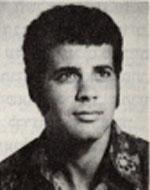David, son of Salima and Ovadia, was born in 1949 in Baghdad, Iraq, and immigrated to Israel with his family in 1951. He studied at the elementary school in Ramat Hasharon, and in his eighth year he moved to Kibbutz Regavim and continued to study there within the framework of the institution. His parents named their son David after the late Zionist leader David son of-Gurion, and when the family immigrated to Israel, David was about a year old when the parents built their home in Ramat Hasharon, and David was a mischievous boy. When he came home on leave, he took an interest in everything, asked his parents and his brother about things that were close to his Lev, and also helped with the various housework. David was known in the kibbutz as a responsible youth: “You could trust him. “Uncle David loved the tractor and fell in love with it,” recalled his brother Yosef, who loved to perform any work that involved the operation of the heavy vehicle. During the Six-Day War, he worked with his friends in the fields of fission , The cowshed and the chicken coop, and volunteered to perform special tasks with the help of the tractor, and was a tall and handsome young man, a loyal son of his parents and a loving brother to Jacob and Joseph, , But when he refused, he volunteered for the Armored Corps. After basic training, he completed a tank training course and for three years served as a tank driver in Sinai. “The service on the desert line was not easy, friends were hurt and killed, the conditions in the desert required physical ability, but David adapted to everything and felt that his work was important and that responsibility was a responsibility on his shoulders.” Only once did he collapse; When he learned of the death of his good friend, Yaniv. David visited his parents’ house from time to time, and did not say much about his hardships and hardships. There was always a smile on his lips and words of encouragement were always found. In the spring of 1971, when he was discharged from regular service, he deliberated for a while about his future. His brother said: “He had an ambition to advance in life and achieve achievements. David began working with his brother, Jacob, and studied building building. He worked hard and got a little drunk, but he soon acquired knowledge and experience and was known for his excellent and dedicated profession. In the wake of an unrequited love affair, he began to read poetry and wrote poetry. Four songs were left, including the song “The Rolling Hair”: “You lowered your eyes with a sigh and your rolling hair / on your bare shoulders / your hands became like spring nights / blossomed as unknown …” The songs express strong love and disappointment in retrospect. At the end of May 1973, David met Amalia, the daughter of Ramat Hasharon, and married her in mid-September 1973. The young couple spent his honeymoon in a sanatorium and at the beginning of their lives David was called to the front. He arrived in his unit on Yom Kippur eve and was sent to the southern front, where he fought as a tank driver and took part in the braking battles. On the 9th of Tishrei 5734 (October 9, 1973) David was killed during a bloody attack by a “device”. His comrades in the battle say that when David and his crew tried to escape from the damaged tank, they were shot to death by Egyptian soldiers from the Second Army. David was declared missing and only five months later his body was found and he was brought to eternal rest in the Kiryat Shaul military cemetery. He left behind a wife, parents, two brothers and two sisters. After his fall, he was promoted to First Sergeant. In a letter of condolence to the bereaved family, the commander of his unit wrote: “Had the soldiers not fought like David fought, we would have had no rebirth. The most precious David was given for our lives and our homeland. ” BThe Kor family contributed to the memory of David Sefer Torah as a synagogue.
